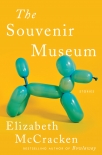The Souvenir Museum by Elizabeth McCracken (essential books to read .txt) 📗

- Author: Elizabeth McCracken
Book online «The Souvenir Museum by Elizabeth McCracken (essential books to read .txt) 📗». Author Elizabeth McCracken
You would recognize my voice, too. People do, in the grocery store, the airport, over the phone when I call to complain about my gas bill. Your voice, they say, are you—?
I have one of those voices, I always say. I don’t mind if they recognize me but I’m not going to help them do it.
He kept telling me I had to be kind. Why? Why on earth? When life itself was not.
A Splinter
When Lenny was sixteen he ran away from home. Sailed. Bussed, as in bussing tables. Walked, from table to table to the ship’s kitchen and back, round and round the decks of the Queen Elizabeth 2, on its voyage from New York to Southampton. His family knew he’d gone—his father had helped him land the job—they just expected him to turn around with the boat itself, same job, opposite direction, home in two weeks. But instead of spending a single day wandering Southampton he hitchhiked to London and tried to get a job in show business. “How stupid,” his mother said, when she heard the news. She was English. He was not. Or he was, but in a way that only he understood.
He had gone to London because he’d fallen in love with a lady ventriloquist on board the ship. If he could have smuggled himself off in her trunks he would have, but she already had a man packed away. A toy man: his name was Willie Shavers. She also had a parrot, a little girl with braids, and a yellow cat. It was the parrot she was famous for: the parrot’s name was Squawkanna, and with Lottie—Lottie was the woman, Lottie Stanley—she’d had a hit song, though that had been ten years before, in the mid-1970s. Famous for a summer. If you heard her name and were English, you’d say, Who? and if you heard the song you’d say, Oh, right. You might wince. It wasn’t a good song. On board the QE2, Lenny had watched Lottie’s act every single night. She was plump in her sequined gowns, and wore her blond hair in an old-fashioned hairdo, with lots of hair spray and a series of paste tiaras. She’d given him her calling card with a flourish, amused by his attention, and now here he was, ringing her bell at the address in Ladbroke Grove, being shown in by the doorman and sent down the hallway to her ground-floor flat.
The hairdo had been a wig, the glamorous face largely makeup, the cheekbones trompe l’oeil. But she was there, like a developing photograph, younger than he’d thought, plusher. She might have been the age of his oldest sister, Eloise, who was thirty-two.
“Huh,” she said, when she saw him. “You don’t belong here.”
“I do,” he said. Then, “I want to learn how to be a ventriloquist.”
She frowned at him. “Good afternoon.” Her voice was different on its own, singsongier.
“Good afternoon,” he said. “Could you teach me?”
“Really?”
“Yeah,” he said.
“Don’t tell me how old you are.”
“I’m sixteen,” he said, knowing he didn’t look it. His body hadn’t changed yet, but his soul had: this year he had developed delusions of grandeur and a morbid nature and a willingness to die for love; next year, pubic hair and broad shoulders.
“Christ,” she said. “Come in.”
Her furniture looked serious, antique: she was a grown-up. The sofa was red velvet. He could feel the wood at its heart, as though, if she manipulated it, she could give it a voice and a personality. He thought she was a very good ventriloquist, though he didn’t know much about what that entailed. She regarded her puppets with indifference, as though their energy tired her; he’d stared at her mouth, waiting to see her lips move. Eventually they would, a little, gleamingly, like a thin necklace you weren’t sure a girl was wearing: you looked for it to appear for the pleasure of having it disappear just afterward.
“I’m not too young,” he said.
“If anything you’re too old. To be a vent. Most boys pick it up ten or so. Where are your parents?”
“Ithaca.”
“Greece?”
“Ithaca, New York,” he clarified.
“Yes, I thought you were American.”
He decided not to argue with that, though he disagreed. True, he’d been born in the United States, and raised there, but his parents were English, his older sisters were English, every single person he was related to was English. A dog is a dog though born on a sheep farm, he told himself.
She said, “Was anybody with you on the boat?”
“No.”
She extracted a cigarette from a tin box and lit it with a large chrome lighter that gave off the scent of fuel. In her act, she struck matches on Willie Shavers’s cheek, then smoked while he talked. “You didn’t stow away,” she said, leaking smoke.
He shook his head.
“But you want to stow away here.”
“I can’t go back,” he said.
“To Ithaca, New York,” she said, with an amused expression. “No? Why?”
He had his reasons, but they were ineffable. The fact was he’d planned from the first day to walk off the boat in Southampton, track down one of his sisters—all three of them lived in England: Katie in Sussex, Fiona in Bath, and Eloise in a village in Norfolk called Little Snoring—and ask for sanctuary. But his sisters would no doubt fling him back to his parents. He felt the nap of the velvet sofa, toed the herringbone parquet floor. One of the planks was loose under his sneakered





Comments (0)